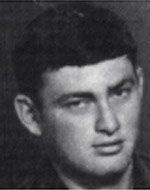Titenstein, Sando-Shaul
Son of Paula and Elkana, was born on July 26, 1949 in Romania. In his native country, Sando completed 8c elementary school classes, and at the age of 15 immigrated with his parents to Israel in 1964. The family settled in Ashkelon. At first, Sando tried to study a profession, frameworks, but preferred to go to work as a tractor operator at Kibbutz Karmia. He later worked as a clerk in a factory. Prior to his induction into the IDF, Sando underwent a pre-military course in driving, and in November 1967 he enlisted in compulsory military service and was assigned to serve as a half-track driver. After training, he was promoted to corporal in May 1967. Sandu took a course in transport transport and was promoted to sergeant. In November 1970 he completed his compulsory service, was released and integrated into civilian life. When the Yom Kippur War broke out, Sandu was called to the army and took part in the war. He reconnected his fate with the IDF when he joined the regular army in September 1974. He was promoted to the rank of sergeant, and in March 1975 he was promoted to the rank of major sergeant, and his position in the IDF forced him to complete his knowledge of Hebrew. Advanced in Hebrew. His opinion at the time was: “He serves as a movement economy in a good and excellent way, responsible, serious, and takes care of the perfection of military equipment.” Sando had an advanced course for transport supervisors, and after the course his commanders said: “He is efficient in his work, adaptable to people in teamwork, a good professional.” Until March 1980, Sando served in the regular army, In 1980, he tried to reintegrate into civilian life, but the Peace for Galilee War brought him back to the IDF. In August 1983, Sando volunteered again for the career army and served as a leading noncom, and on May 9, 1984, he suddenly fell ill, and in a state of unconsciousness he was rushed to the hospital, and his doctors’ efforts to rescue him failed, 15 May 1984. He was buried at the military cemetery in Ashkelon and left behind a wife, three sons and a daughter, and his unit commander wrote in a letter of condolence to his family: “With the death of your loved one, We have lost a dear friend and father who has served as a model for his friends and soldiers in the unit, in his warm and comfortable manner, in his honesty, fairness and dedication to his friends. IDF will Nhmtcm “
